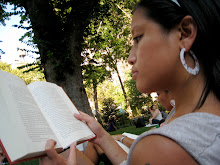
I don't usually post on anything here besides book reviews, music videos and photos, buuuut the conclusion of Lost deserves a special post. All season, I've been writing a series of emails analyzing/ruminating on each episode. Here is the final email:
The end of an era, everyone. I am devastated that this brilliant show is over. Seriously, I feel like I just went through a wrenching breakup. I was exhausted while watching the finale -- one moment gasping, another laughing, but most of all sobbing like a baby (really not kidding. Just about every two seconds, my eyes welled up). I honestly believe that the writers did a truly wonderful job of tying together many of the loose ends. Yes, many questions will remain unanswered, but the truths that were important were the ones that were revealed to us.
Here are a few of the best lines of the finale, many of which pointed to the final "twist" of the series, and many of which were simply great:
"Nothing is irreversible" -- Kate to Jack. The same words Jack says to Locke before he fixes him.
"I'll see you on the other side" Jack says to Locke before going into surgery
"That's a hell of a long con, Doc" -- Sawyer says to Jack. In many ways, the entire alt timeline/sideways world is a bit of a long con, for us, the viewers :)
"You can't let other people tell you who you are. You have to decide for yourself" -- Hurley to Sayid.
"You disrespect his memory by wearing his face" -- Jack to Not Locke
"I don't believe in a lot of things, but I do believe in duct tape" -- Miles
"DON'T BOTHER ME!!" -- Lapidus to basically everyone
"It worked" -- Juliet to Sawyer
"Everything that's ever happened to you is real." -- Christian to Jack
Final thoughts: I don't believe many of the big questions need to be answered. (i.e., why can't women stay pregnant on the island, what was the point of the dharma initiative, why/how was Walt "special," why there were Egyptian symbols all over the island) This show doesn't need to answer everything. Many of these concepts can be attributed to the enigma that is the island. Sure, some people want a clear-cut answer, but I'm not one of them. The whole point is that this show was based purely on the show creators' mythology.
It took me a moment to figure out Desmond's purpose on the island. Because of his ability to withstand intense amounts of electromagnetism, he was able to wade to the center of cave, and literally uncork the light, thus initiating the destruction of the island, and more importantly, making Not Locke human.
Hurley is the final candidate! Really didn't see that one coming. And in a way, it makes perfect sense. Hurley, with his all-encompassing love, his good nature, his big heart. And Ben as his "number two." Brilliant. Ben is the steel, the brains, the loyalty.
We are left to wonder at the future of those that were able to escape the island -- namely, Kate, Claire, Sawyer, Lapidus, Miles and Richard. And we are also left wondering how long Hurley remained the candidate, who was elected afterward and what Ben and Desmond did on the island for the rest of their lives. To be truthful, I like not knowing. Their futures are ones that we, the audience can imagine on our own.
Many of the "flashes" they all experienced were really quite beautiful to watch. (Okay fine, some were over-the-top cheese). But, in a way, each "flash" was a tribute to the years we have spent with these characters, watching them grow with one another.
I believe that Jack was the hardest to get to "flash" because of his nature. Simply put, the strength of his own convictions got in the way, just like on the island. He can be so pigheadedly stubborn, but once he is convinced of his path, he is able to let go with a perfectly clear conscience. I thought it was particularly poignant that the room where he reconnects with his father, Christian, contained all the religious
symbols of the world.
Jack dying in the original spot that he woke up in was a stroke of genius. And Vincent!! Seeing that perpetually happy dog settle down next to Jack as he was dying just about broke my heart. I'm sure the dog gave Jack a measure of
comfort, as did the sight of the Ajira plane taking off.
The end of this show was a work of art. It was a truly beautiful concept -- the fact that these people, their love for one another, was so strong that they created a "world" where they could all be together; a kind of metaphysical stopgap between living and death. Yes, whatever happened happened and yes, they all died in the original timeline, whether it was on the island, or some time in the future off the island. Yet they came to this place in the end to find one another, to reconnect, to experience the sheer joy of What Could Have Been. Not everyone is there. Some are ready to move on, while others need to bide their time. In the end, they gave themselves the opportunity to just
be together. Lost is truly an inimitable study of human nature, of the ties that bind us all.
Lastly, a very large part of the reason why I loved this show so much was the escapism factor. To me, escapism is a way to imagine a world so foreign to us, that it requires a true leap of faith to believe in it. I
believed in this show, in this world, in these characters. It took me to a place I couldn't ever have dreamed of myself. Thanks, guys, for letting me share my long-winded and often ridiculous thoughts on this show. It's been a great ride.













































